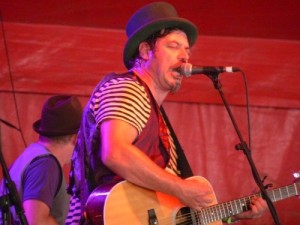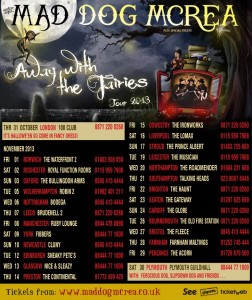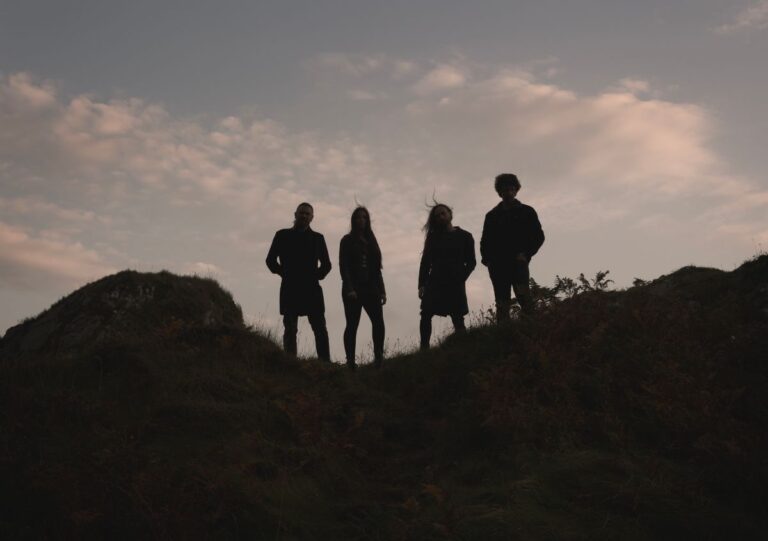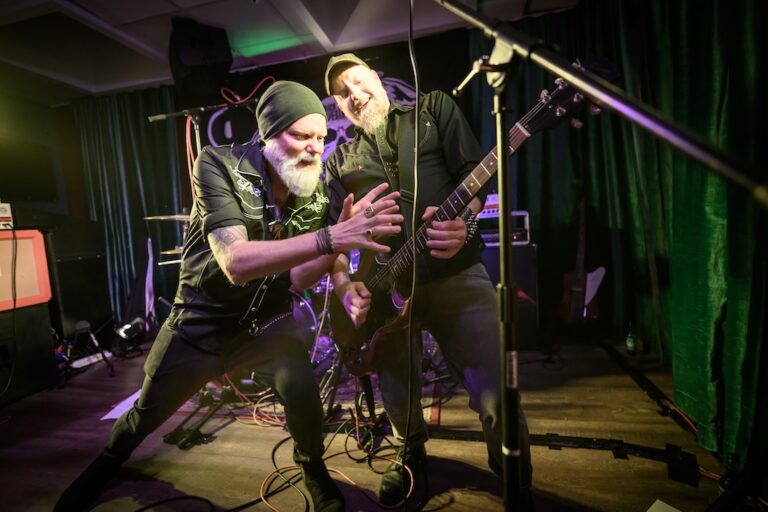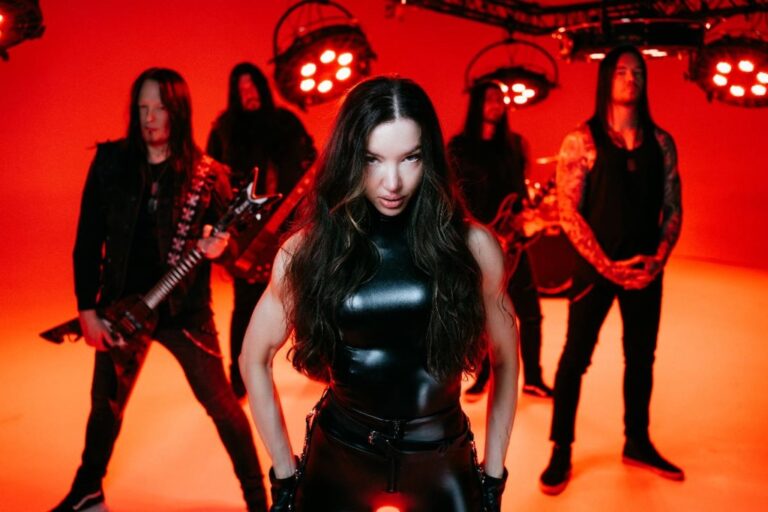Some genres (for example progressive music) are born out of an intense passion, but require such levels of concentration on stage that live shows are often stolid recreations of an album’s musical magic. Other genres, such as punk and folk, thrive on the spontaneity of the moment and whilst what you may hear on the night may bear little resemblance to studio counterparts, the beauty of a folk gig is that you’re often too busy dancing to care. Mad Dog Mcrea are such a band. Their intense, energetic and sweat-soaked live show is about living entirely in the moment and their sound, which takes in traditional folk, blues and even slight hints of punk, is a thing of joyful, ebullient beauty. Fronted by the charming Michael Mathieson, an amiable cross between Jack Sparrow and Keith Richards (and who is interviewed below), the band are the aural equivalent of an instant party and their enthusiastic following (who cram into every corner of Leicester’s excellent Musician pub) rarely stop dancing unless it is to take another swig of foaming, nut brown ale.
Taking to the stage amidst loud whoops and cheers, Mad Dog Mcrea simply demolish the venue. There is an earthen honesty about their performance which transcends the studied artifice so often found in modern music and songs such as ‘Raggle Taggle Gypsy’ and ‘am I drinking enough’ encourage full-throated participation from a crowd on the verge of combustion. Also on display is the more traditional side of folk music in songs like ‘Curly wurly Jig’, a beautifully romantic instrumental that evokes images of lush green fields and tall, eternal oak trees, impervious to the ravages of time and as enigmatic as nature itself. Other delights for the audience arrive thick and fast – the mass sing-a-long of ‘black fly’, the energetic ‘bee’s wing’ and even a rousing cover of ‘bear necessities’ (after which surely everyone in the venue whether young or old were sporting huge grins) – and it seems as if only a moment has passed before the band leave the stage. Of course we get an encore in the form of Devil’s cauldron’, but this was one of those rare gigs where time just seemed to vanish under the weight of the band’s beautifully melodic, brilliantly chaotic and alcoholically enhanced performance. Mad Dog Mcrea are a genuine treasure and must be seen in the live environment – do yourself a favour and get to one of the band’s shows before the tour draws to its conclusion on Nov 29th.
After the show we were lucky enough to grab Michael for a few words about the band’s development and recording habits:
You’ve been touring around the UK – you’re doing, what, twenty dates?
Twenty-seven… three days off!
So the first thing to ask is how you manage to balance life around the hefty commitments of such a tour?
Well the tour is all or nothing when we want to tour. To be honest it’s like a holiday and we knew six months ago we were just going to take November off and that’s it. We organize our families and everything around that and that’s it basically – it’s just all about going on tour basically.
It’s ten years of making music for you…
I’d say a little bit longer than that actually, but yeah, in this formation I’d say ten years.
And in that time the world seems to have moved in a more disposable direction in terms of music – do you consider it a success that you’ve carved out such a lengthy career?
Yeah – it’s a strange one because we’re based down in the South West of England and we’ve got a really good following down there. I think the type of music we do, because it’s so upbeat, it’s kind of charmed in a way so that we get to play lots of parties, we get to play lots of weddings, all sorts of things, so it actually means we don’t have to work, so we can do this full time because there is the market out there. Then a couple of years ago we decided to start heading into festivals and the touring scene and, yeah, I think folk became a big thing for a while, so we kind of jumped on the bandwagon the last couple of years…but yeah, it’s a charm, musically, it’s quite easy to get gigs doing this type of music.
With Ade Edmondson, for example, moving out of comedy and concentrating on music along with increased visibility of a number of other high profile acts, it seems that folk is on the ascendency – do you find that it’s had an impact on you?
Oh yeah. I think since Mumford and Sons, and not just them – there were big bands before – but I think a lot of bands have taken it… a lot of mainstream bands have taken a folky element. For example the fleet foxes have a folky element and it’s definitely helped; more on the national scene for us, because now we can be a touring band and not just a party/wedding band. We’ve had a lot of local success down in Devon and Cornwall, but we can take it further now because people like to listen to folk.
I used to live in the South and the perception is that it’s quite difficult to escape from the area into the national/international scene – would you agree?
Definitely yeah – it’s just a very comfortable place to live down in Devon and it wasn’t until… like I said, we’d been playing down there for years and it’s quite comfortable making a half decent living as a musician… and this agent came upon us and he kicked our ass and basically told us that we should be doing more around the country. So it was basically him, otherwise we’d still have been down there playing our little circuit because it is a bit of a trap down there and it’s so far to get anywhere. We found it amazing, especially here in the Midlands, you have all these cities so close together – they’re only an hour away from each other, from Manchester to Leeds to Liverpool to York – everything’s an hour away whereas down in Devon you’re more or less four or five hours form anything which makes a big difference.
One of my roots into folk music was through the punk and later the folk punk scene – genres that seem initially quite disparate and I was wondering if the connection is more about the passion and purity of the music and that’s what links the two styles together?
I think yeah- I came from punk as well. I was in punk bands as a teenager and my early 20s and I don’t know how I ended up in folk. I think the Pogues had a lot to do with it, especially my era, growing up in the 90s, late 80s and that, they came from a punk element and that just made so much sense to me. I was bought up in Ireland with traditional music, I loved punk music, and then bang the two together and you’ve got fast furious music, exactly as the Pogues did it… but they did it before us… a long time before!
When you kicked off, the internet was not a big deal and folk music spread through word of mouth, but now, of course, everything is on line – how has that affected you as a band?
In advertising mainly, especially on tours. To be honest, most of the advertising for tours is online, on places like Facebook, it’s so much internet-based and promoters are only just keeping their jobs because there’s so much you can do for yourself now. When we started there was no such thing as the internet, it was a bit more than ten years ago, and we were more of a cabaret – we played a lot in Scandinavia we did all the Irish pub scenes so we started out more as a busking band.
As a band it seems that you’re so much about the live environment – how do you go about recording?
Well, we’ve learned our lesson there because we did a couple of albums, like studio albums, and we couldn’t get that essence of what we do live because we were in the studio layering and working with the producer. We’re very self… we’re not signed to a label or anything and we just finance these things ourselves and we did our albums on a budget. But lately, this last couple of months, we’ve just gone in and done a live studio album which sounds brilliant because… I’m not saying it’s ‘brilliant’ because it’s warts and all… but it captures the energy because we just played until we got it right and then digitally recorded it – no overdubs or anything – and that’s the way to record folk music. We’ve learned that after two albums of layering things because it just sounds really sterile and you need it so you’ve got that fire and the sparks coming off, so yeah, definitely live recording is the way forward.
Have you thought about recording in front of an audience at all?
Well, yeah we have, a lot. And we have done it a lot, but unless you’re in a venue for three nights in a row, or unless you’re consistently doing over a tour, the problem is we have too much of a good time and we end up getting pissed or whatever and then make mistakes and we listen back the next day and realise we can’t put it out! And it’s quite an expensive way to do it as well, we just found going into a good studio where we can all play together and see each other – that’s the way it worked for us. So we’ve just done a new album, which is not ready yet, but yeah that’s the way to record for us.
Want to know more? Check out the video for ‘Happy bus’
